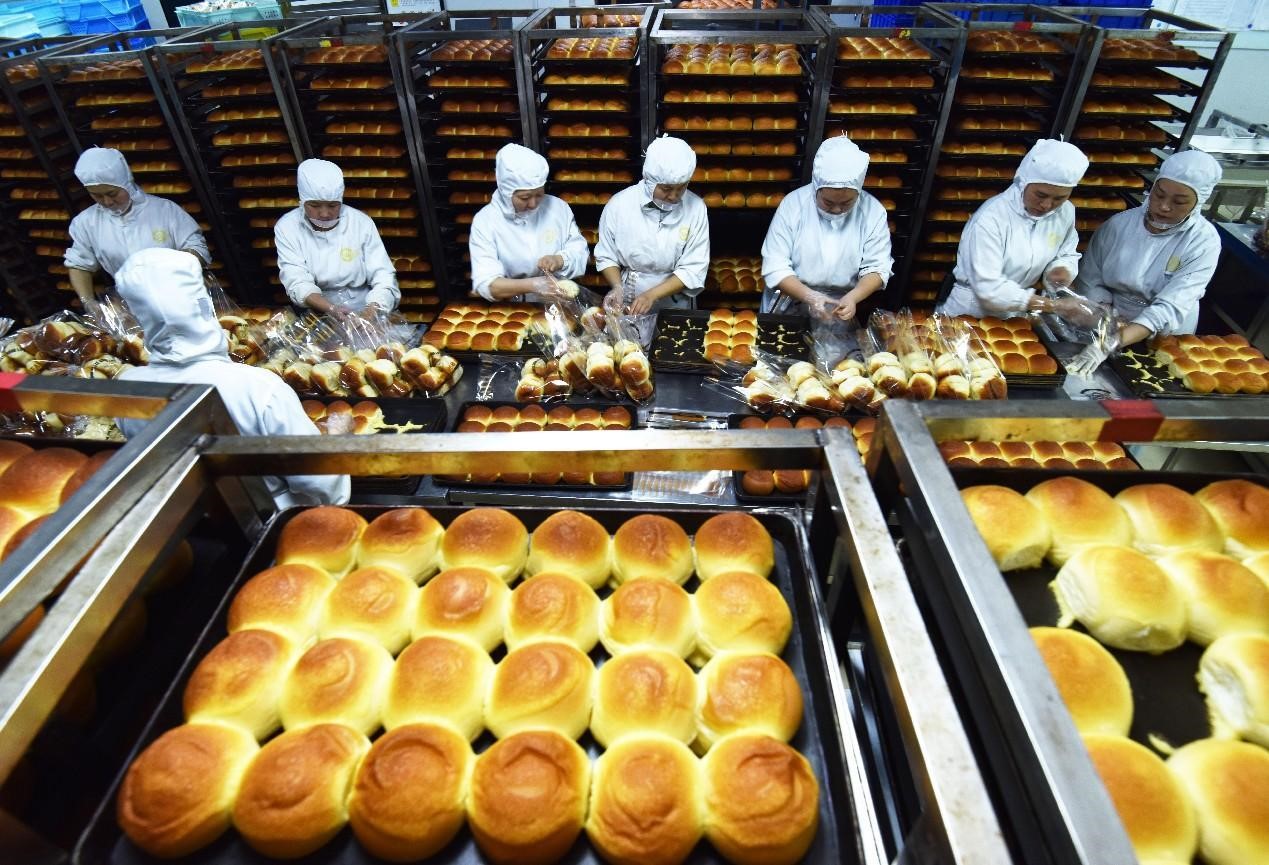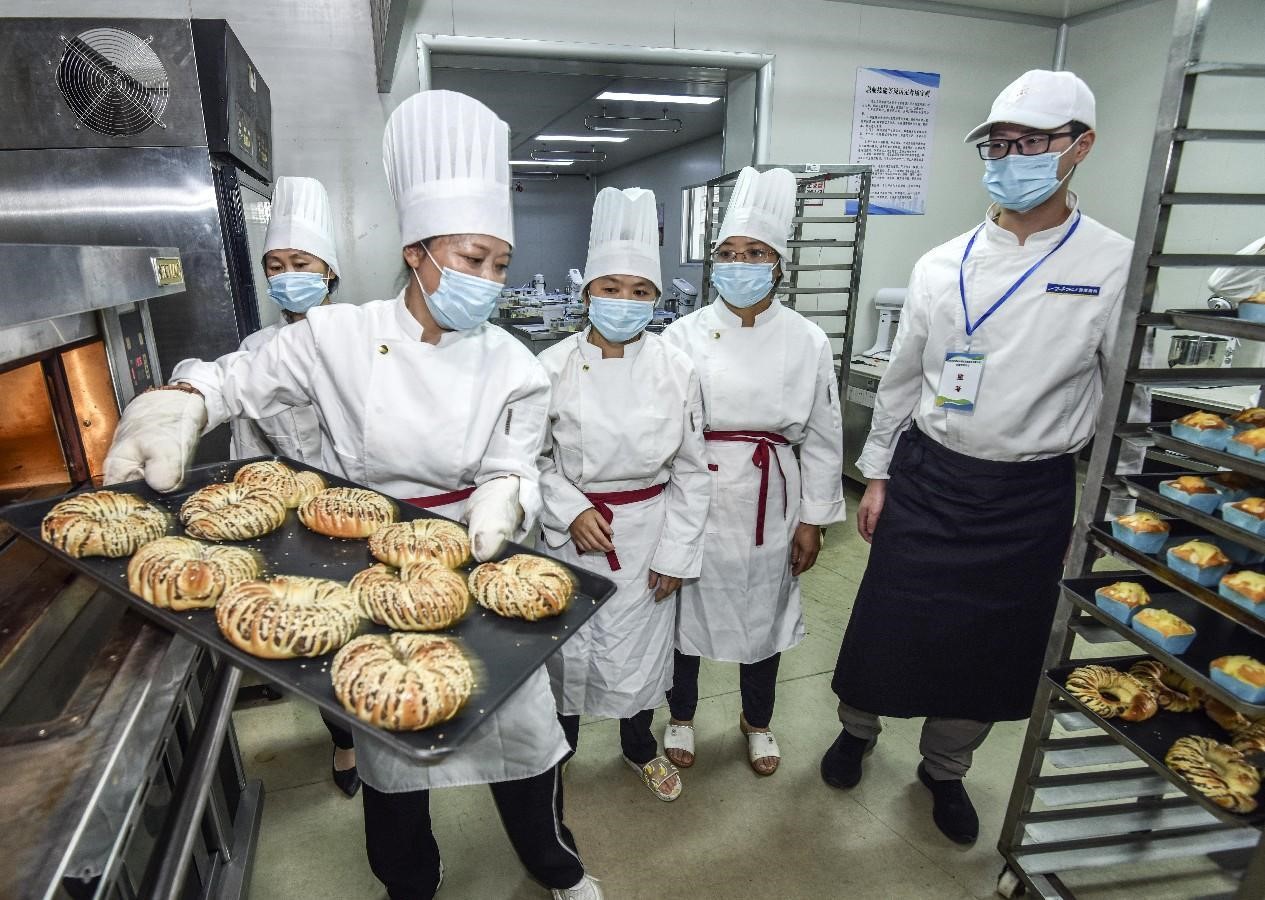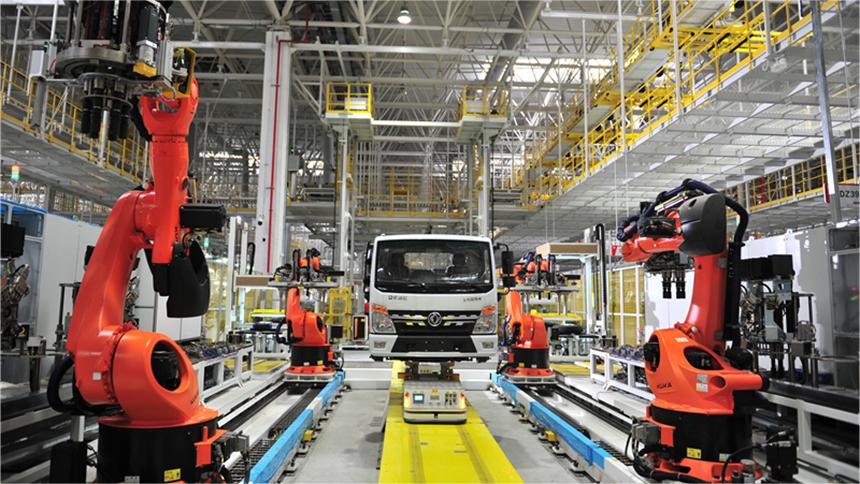Small county in E China develops billion-yuan bakery industry

"Zixi Bread" products are packed in a workshop in Shaoxing, east China's Zhejiang Province. (Photo by Wu Zhigui/People's Daily Online)
A small county inhabited by 100,000 people in east China just created this unbelievable miracle - nurturing over 40,000 bakers in the past 30 years and opening 16,000 bakeries across the country. It boasts a bakery industry whose annual output nears 30 billion yuan ($4.14 billion), and has incubated a series of well-known bakery brands such as Bao's Pastry and Zankee.
As a matter of fact, Zixi county in Fuzhou, Jiangxi Province, is not very "talented" in developing the bakery industry. It is surrounded by the Dajue Mountain, the western foothills of the Wuyi Mountains. About 80 percent of its land is mountainous terrain.
The initial development of the bakery industry in Zixi county relied heavily on the expertise and influence of local skilled individuals.
Zhang Xiewang is exactly one of them.
Zhang, who once attended relevant skill training sessions organized by the military unit he served in, retired together with his comrade-in-arms Hong Tao in 1987. The two raised about 10,000 yuan and opened the first bakery in Yingtan, Jiangxi Province.
After weathering the challenges of starting a new business, their venture began to thrive. Therefore, they ventured back to their hometown, carrying their hard-earned capital, to open more bakeries.
With their success, friends and relatives began knocking on their doors, seeking experiences of running a successful bakery business. The duo welcomed them wholeheartedly, imparting their knowledge and skills without reservations.
In the span of a few years, they had mentored and trained over 100 apprentices, with the parents of Bao Caisheng, founder of the now internet-famous Bao's Pastry, among their first batch of students.
Ever since, a strong "bakery force" has been gradually formulated and began venturing into all parts of China.
Initially, bakers from Zixi who ventured out primarily operated family-run bakeries, such as husband-and-wife or sibling partnerships, which were relatively easy to establish. However, they subsequently faced a myriad of challenges, including difficulties in securing funding, acquiring baking skills, and generating profits.
"For the industry to thrive, going solo is not viable," said Xu Quanlong, who had expanded his bakery business to Hangzhou in Zhejiang Province and Kaifeng in Henan Province. At the invitation of relevant departments of Zixi county, he returned home and founded a bakery training center, where he has trained over 10,000 bakers to date.

A bakery skill contest is held at a bakery vocational school in Zixi county, east China's Jiangxi Province. (Photo by Wu Zhigui/People's Daily Online)
Zixi county has taken strategic measures to drive the growth of its bakery industry, including inviting successful entrepreneurs who had ventured out to establish training centers in the county, formulating industry standards, and encouraging financial institutions to provide "bakery loans" and other financial products and services to small and micro businesses.
The county has identified the bakery industry as a key driver for developing its local economy. It has even established a dedicated bakery industry development office to systematically implement a series of supportive measures.
"In recent years, branded bakery products have become mainstream in the market. To better embrace this trend, we need to concentrate our efforts," said Zeng Changhua, head of the bakery industry development office.
In recent years, the county has been exploring a cluster-based development approach for its bakery industry. After "Zixi Bread" was approved as a collective brand in 2018, a bakery technology development company was established in the county to advance brand development and operations.
To support brand building, the county holds bakery industry forums, bakery festivals, and other events on a regular basis, promoting new products and facilitating industry exchanges.
Building upon its growing reputation, the county established a bakery industrial park. The park has been joined by a meat floss processing plant with a daily output of 100 tons and a premix flour factory with an annual production capacity of 6,000 tonnes, which are able to serve over 300 bakeries within a 300-kilometer radius. Supporting enterprises producing chocolate, frozen semi-finished goods, and cream have also joined the industrial park.
"The cluster-based development approach enables not only efficient supply but also better cost and quality control," Zeng said. "With the ability to improve product quality, we are confident in the development of our brand."
Inside the spacious and well-lit standardized factory buildings of the bakery industrial park, workers have designated roles - some shape the dough, others handle slicing. Under the warm golden glow of the ovens, the bread takes on an enticing color.
In an office, a large screen divided into 16 sections displays real-time footage from various store locations. Computers store data on ingredients, production, logistics, and sales.
"We have a clear record of the circulation of bread right from the production line," said Qian Haihua, general manager of the bakery technology development company.
By analyzing sales data feedback from different regions, the company can accurately gauge market trends to guide the next day's production plan and provide basis for product design and development.
"The bakery industry sees rapid product renewal. Our company phases out three to five slow-moving products every month," Qian told People's Daily.
Leveraging data support, Zixi's bakery industry is pioneering an integrated system integrating online platforms, retail stores, customer services and modern logistics to improve the supply chain and service capabilities through intelligent upgrades.
"The bakery business in Zixi has grown from nothing to a big industry. It was initially driven by our fellow townsmen, and later expanded through public services and a conducive institutional environment," said Zeng.
"Now, with the bakery industry as a backbone, we aim to explore synergies with organic agricultural production, cultural tourism, and other related industries," Zeng noted.
Photos
Related Stories
Copyright © 2024 People's Daily Online. All Rights Reserved.









